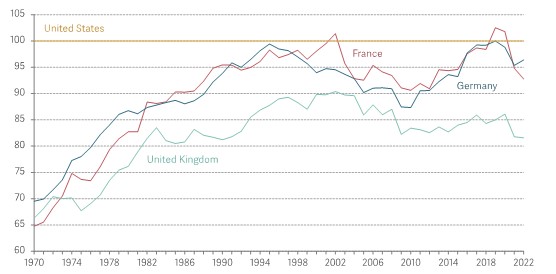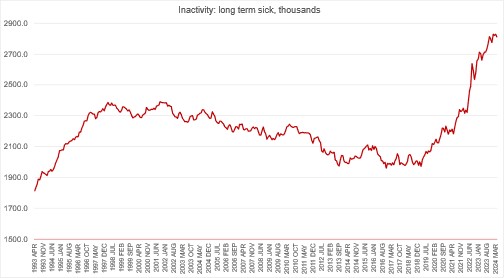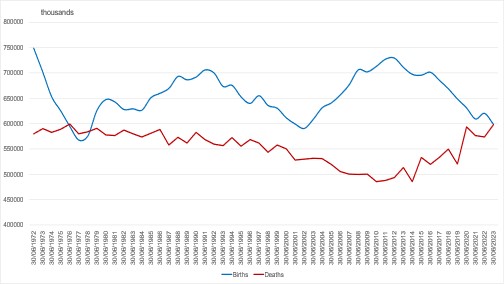Even with one of the largest parliamentary majorities in its history and the Conservatives with their lowest-ever vote share, the incoming Labour administration faces a daunting task: improving UK economic growth. It knows that was why it was elected; after all, growing the economy through increased productivity was the focus of its election campaign. It knows too that it must make the tough decisions, particularly unpopular ones, as early as possible in the political cycle.
That is why its huge majority is somewhat misleading. It likely represents a high point and will surely diminish at the next general election, especially if it does not deliver on the promises that it made when it was elected. With some 40 bills in the King’s Speech, the Labour Party has ‘hit the ground running’, with the most announcements in a single such event since 2005.

Unsurprisingly given the multitude of issues facing the UK, not all the bills are directly related to its ‘growth agenda’ (some are about social, health, environmental and other issues), but most of them have that overarching goal in mind. Even government bills that are, for example, aimed at improving the NHS and cut waiting lists should help to reduce the number of people that are off sick. This, in turn, would increase the working population, creating the potential for faster economic growth as more are employed.
The following charts show why this is important. 2.8 million people are signed off as long-term sick, and that number needs to come down to help grow the economy. More people employed can lead to higher productivity. That is especially important as another figure landed on the same day as the King’s Speech: the UK’s birth rate has fallen below its death rate.


In other words, the domestic population will start to decline and, therefore, any growth in its population will have to come from immigration, unless death rates soon fall, and birth rates rise. Since this is a particularly toxic political issue at present, employing as many people already in the UK as possible through more work-friendly policies, reducing sickness levels, and improving flexible working to increase the number of those in work, seems attractive in the context of shrinkage in the domestic population.
The new government identifies weak productivity growth as the main source of the UK’s economic problems and has announced several measures in the King’s Speech to tackle it. That covered five main areas:
- Reform the planning system to make it easier to build residential and commercial property where businesses want to locate, and people want to live. However, there was little detail on how this was going to be achieved other than devolving power to local areas and empowering mayors to deliver. So, one could expect more on that since it’s the centrepiece of their commitment to build 1.5 million homes over five years.
- The creation of British Energy, to be based in Scotland. That will be bolstered by changes in regulation to improve energy efficiency – some of these have already been announced, e.g., removing barriers to wind farms and solar energy, thereby improving the grid by allowing the building of pylons and other energy infrastructure to take place without being prevented by a sclerotic planning system – also, a bill to enable the Crown Estates to borrow more to invest in infrastructure.
- To devolve power to more local areas while setting the overall agenda so that funding for growth projects and house building can be managed and delivered locally in a way that suits local conditions.
- Tackle the inefficiencies in the delivery of public services. Figures released on 17 July showed that the productivity of the public sector was no better than it was in Blair’s government. Moreover, public productivity fell by 0.6% in the year to June 2024 and has not fully recovered from the pandemic.
- The creation of a national wealth fund is designed to funnel investment through the British infrastructure bank to critical projects.
It was fascinating that one minister said there would be no new public sector funding without ensuring productivity gains. To this end, a review across all public sector organisations would be conducted to see how productivity can be improved using AI and technology.
Other key announcements to note, in no order of importance, are:
- Water bosses will be held to account for leaks, through criminal action and prevention of bonuses being paid.
- A new Passenger Railway Services Bill could result in nationalisation when current contracts expire.
- As in London, local mayors or councils will be able to take over local bus services and integrate them.
- The High-Speed Rail Bill, previously tabled to build the now-scrapped northern leg of the HS2 rail link, will be given powers to create new rail infrastructure in northern England.
- A Budget Responsibility Bill to ensure official forecasts assessed by the Office for Budget Responsibility (OBR) must take place ahead of Budgets.
- The Digital Information and Smart Data Bill will allow people to use digital IDs to buy age-restricted products and pre-employment checks.
- Skills England Bill will set up a new arms-length body of the same name to boost and regionalise training.
In summary, given the enshrining of the oversight of government economic and fiscal policy given to the OBR, what they say about what these measures mean for the sustainability of fiscal policy and the economy will draw a lot of financial market attention. Ultimately, however, the UK electorate will judge the government on how it turns around the UK’s economic fortunes, whether it builds more homes (council and private), improves UK infrastructure, raises living standards and runs the economy more efficiently. It’s got five years to make a convincing enough start to get reelected.

